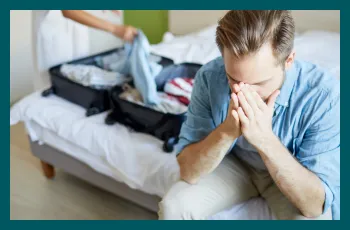9 Health tips when travelling with children (for parents)
Written by Editorial staff writer at Hola Medically reviewed by Dr Gosagan Gopalakrishnan, BSc (Hons), MBChB, DRCOG, MRCGP, FRACGP

Contents

Travelling with children can turn a simple trip into an amazing adventure, but it also requires extra planning to ensure everyone’s well-being and satisfaction. From planning to packing efficiently, keeping your little explorers safe and comfortable demands extra diligence and effort. Let’s dive into essential health tips for parents to guarantee your family vacation is joyful and free from unforeseen problems.
Is it common for kids to get sick after travelling?
Yes, it is relatively common for kids to get sick after travelling. Multiple factors contribute to this:- Change in the environment: Travelling frequently exposes kids to unfamiliar environments, potentially exposing them to new germs and bacteria that their immune systems are not accustomed to
- Disturbance of routine: Alterations in sleep habits, diet, and daily routines can impair a child’s immune system and elevate their susceptibility to infections.
- Travel fatigue: Long journeys can be exhausting and stressful, influencing a child’s overall health and immune function.
- Exposure to other travellers: Airports, train terminals, and other transportation centres are densely populated locations where viruses and bacteria can rapidly spread.
Feeling sick and unsure why? Speak with a GP online in 15 minutes.
See a Doctor now
Available 24/7, across Australia.
Common travel troubles
By planning and packing essential remedies, you can mitigate these common travel troubles:- Jet lag: This occurs when you shift time zones and upset your body's internal clock. To minimise it, gradually modify your sleep pattern before leaving, remain hydrated, and get some sunlight at your location to restore your circadian(sleep) cycle.
- Ear pain (aircraft ear): Rapid elevation fluctuations might cause ear discomfort. To equalise pressure during take-off and landing, you can chew gum, yawn, or use specific earplugs.
- Traveller's diarrhoea: Traveller's diarrhoea is typically caused by ingesting contaminated food or water. Drink bottled water, avoid street food, and carry anti-diarrheal medicine or just-in-case antibiotics. If you are unsure about whether to carry antibiotics with you, please speak to one of our doctors.
- Motion sickness: To control motion sickness, which is caused by confusion between your eyes and inner ear, sit at the front of a vehicle, focus on a stable object, and avoid large meals before travelling. Travel sickness medications containing dimenhydrinate and hyoscine are also useful.
- Deep vein thrombosis (DVT): Long flights increase the risk of blood clots, particularly in the legs. To lower the chance of injury, walk every hour, perform calf exercises, remain hydrated, and wear compression socks. DVT is less likely in young children, but they need to keep mobile too.
- Sunburn: When visiting sunny areas, wear a broad-spectrum sunscreen with an SPF of 30 or more and re-apply every two hours, especially after swimming or sweating. Wearing protective clothes like caps and sunglasses can also help avoid burns.
- Altitude sickness: High-altitude travel can cause symptoms such as headaches, dizziness, and nausea because of low oxygen levels. Ascend cautiously, remain hydrated, and avoid alcohol. Acetazolamide and other medications can help prevent or alleviate symptoms. Speak to our doctors if you think you may need a prescription for medications such as acetazolamide.
- Dehydration: Long flights, high temperatures, and strenuous physical activity can all cause dehydration. Drink lots of water, especially in hot climates or on airplanes with low humidity and avoid excessive coffee and alcohol.
- Insect bites and allergies: Wear long sleeves and apply insect repellent containing DEET if you are in an area where mosquitos or ticks thrive. If you have allergies, pack antihistamines or an EpiPen.
How to prepare – health tips
By employing these precautions, you can maintain health and ensure a smoother journey:- Consult a doctor: Get a pre-travel health assessment and discuss any vaccinations or medications required for the travel destination (such as malaria or typhoid).
- Pack prescription medications: Bring enough for the journey and extras in case of delays. Keep a duplicate of your medications in case they are needed abroad.
- Prevent blood clots: To reduce your risk of deep vein thrombosis on lengthy flights or road journeys, move around regularly, stretch your legs, and wear compression socks.
- Protect against insects: For areas where mosquito-borne illnesses such as malaria or dengue are common, bring insect repellent and mosquito nets or sprays.
- Stay hydrated and eat well: Stay hydrated during flights and eat balanced meals to avoid stomach problems.
- Sun protection: Bring sunscreen, sunglasses, and a hat to avoid sunburn, especially if travelling to tropical or sunny places.
- Prepare for allergies: If you suffer from severe allergies, carry antihistamines or an EpiPen. It is critical to study possible allergies on your trip.
- Mental well-being: Pack relaxing products such as sleep aids or travel pillows and take time to rest during lengthy flights.
- Insurance: Make sure to have sufficient travel insurance that includes coverage for medical issues abroad, such as emergencies and evacuations.
- Eat light before travel: To avoid discomfort, avoid heavy, fatty meals before taking a flight or driving.
How to deal with travel health troubles with Hola?
Hola Health can help you manage travel-related health concerns effectively by offering telehealth consultations and on-demand medical advice from anywhere in the world. If you encounter jet lag, traveller's diarrhoea, or motion sickness when travelling, you may easily consult with a doctor via video call. Here are the services we provide:- Web online doctors: Quickly connect with a doctor to address common travel issues such as jet lag, diarrhoea, or altitude sickness. You can get advice on how to control symptoms and avoid additional issues.
- Prescriptions & pharmacy delivery: Hola Health can provide digital prescriptions for ailments such as traveller's diarrhoea, infections, and even motion sickness. Pharmacy delivery is available in some areas, so you can get your medications without visiting a local pharmacy.
- Medical certificates online: In case you fall ill during your trip and require an extension of your stay or time off from work, Hola Health can provide an online medical certificate after a consultation.
- Preventive travel health information: Before travelling, check out our website for information on essential vaccinations, medicines, and health measures specific to your destination.
- After-Hours doctors: For urgent situations or problems that occur after regular hours, Hola Health provides after-hours consultations, offering convenience in addressing health issues regardless of the time zone.
Get your prescription online within
15 minutes, anytime, anywhere.
15 minutes, anytime, anywhere.
Request an instant script
Available 24/7, across Australia.
What we treat
- Cough
- Nausea & vomiting
- Fever
- Hayfever
- Fatigue
- Sore throat
- Acne
- Hair loss
- Gout
- Eczema
- Rosacea
- Sunburn
- UTI
- Erectile dysfunction
- Contraception
- Morning sickness
- Morning after pill
- Prostate health
- Anxiety
- Depression
- Stress
- Grief & loss
- Antidepressants
- Premature ejaculation
- Asthma
- Blood pressure
- Blood thinners
- Diabetes
- Cholesterol
- Migraines & headaches
- Allergies
- Body ache
- Heartburn & reflux
- Sleep disorder
- Pain relief
- Gastro
Related Articles
Hangover And The Heart: Effects Of Excessive Drinking On The Human Body
December 10, 2025Diet/Lifestyle
How Drinking Excessive Alcohol Affects Your Health Written by Sai Pragna Chagarla, Staff Writer ÔÇô...
Disclaimer
This blog is for general informational purposes only and does not indicate that Hola Health provides all treatments or preventive measures mentioned. It is not intended to be a substitute for professional medical advice. Always seek the guidance of your doctor or other qualified health professional with any questions you may have regarding your health or a medical condition. For emergencies please immediately contact 000. Any medical topics discussed are intended to educate, not to imply availability through Hola Health.
 Facebook
Facebook  X
X  Copy Link
Copy Link



